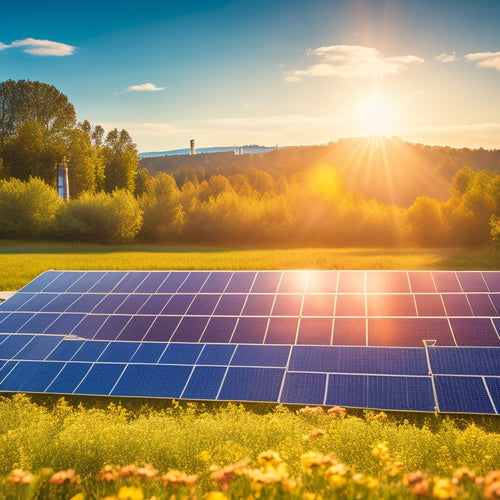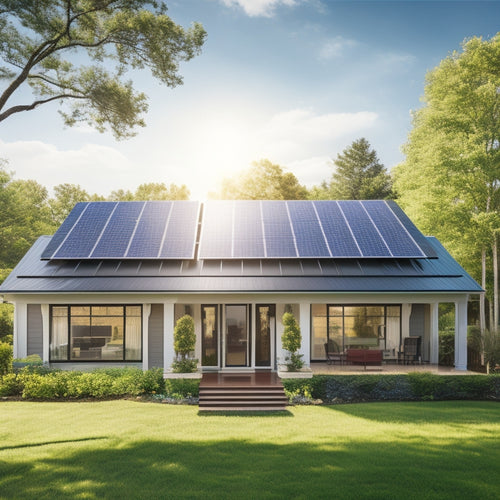
Commercial Solar Panel
Share
You're considering installing a commercial solar panel system, which can greatly reduce your carbon footprint, with the solar industry already offsetting over 73 million metric tons of carbon dioxide emissions annually. By shifting to solar energy, you'll not only minimize your environmental impact but also save money on electricity bills through high-efficiency photovoltaic cells and innovative designs that maximize energy savings. With advanced solar technology, you can generate electricity at a higher rate, reduce your reliance on the grid, and increase profitability. Now, explore how you can utilize the full potential of solar energy for your business.
The Essentials
- Commercial solar panels reduce carbon footprint by minimizing reliance on fossil fuels and lowering energy production emissions.
- High-efficiency photovoltaic cells in commercial solar panels maximize energy savings and provide a significant return on investment.
- Transitioning to solar energy significantly lowers electricity bills and provides long-term cost savings for businesses.
- Advanced solar technology and energy storage solutions enable energy independence, reducing reliance on the grid and protecting against rising utility costs.
- Commercial solar panels attract eco-conscious customers, enhance brand reputation, and provide a competitive edge in the market.
Reduce Carbon Footprint Now
You can greatly reduce your carbon footprint by shifting to a commercial solar panel system, which decreases carbon emission reduction by offsetting your reliance on fossil fuels.
By adopting solar energy, you'll not only shrink your carbon footprint but also contribute to a cleaner environment.
Additionally, with solar incentives, small businesses like yours can benefit from tax incentives and energy savings, making the shift to renewable energy even more attractive.
Carbon Emission Reduction
Approximately 65% of the world's carbon emissions come from energy production, making a significant reduction in carbon footprint a pressing concern.
You're likely aware that your organization's energy consumption contributes to this problem. By adopting sustainable practices, such as investing in Renewable Energy Solutions, you can reduce your environmental impact and help mitigate the effects of climate change.
Additionally, embracing green technology can also provide significant cost savings and enhance your brand's reputation.
Commercial solar panels are an effective way to decrease your reliance on fossil fuels and lower your carbon emissions. When you switch to solar energy, you're reducing your organization's carbon footprint and contributing to a cleaner environment.
This not only benefits the planet but also enhances your brand's reputation and appeals to customers who value eco-friendly practices.
Renewable Energy Source
Commercial buildings rely heavily on non-renewable energy sources, which greatly contribute to greenhouse gas emissions. You, as a business owner, can reduce your carbon footprint by shifting to a renewable energy source. Solar technology offers a sustainable solution, providing energy independence and minimizing environmental impact.
| Benefits | Description | Advantages |
|---|---|---|
| Energy Independence | Generate your own electricity | Reduce reliance on grid power |
| Environmental Impact | Lower carbon emissions | Contribute to a cleaner environment |
| Cost Savings | Reduce energy costs | Increase profitability |
Innovative designs and solar incentives make it easier to integrate solar technology into your commercial building. With grid integration, you can store excess energy and use it when needed, reducing your reliance on non-renewable sources. As the future trends towards sustainable solutions, you'll be at the forefront, enjoying community benefits and contributing to a cleaner environment. By switching to a renewable energy source, you're taking an essential step towards reducing your carbon footprint and achieving energy independence.
Save Money on Electricity
You can considerably lower your electricity bills by utilizing solar energy.
With high-efficiency solutions, such as photovoltaic cells, you can maximize energy savings for your business.
By installing commercial solar panels, you'll cut energy costs and reduce your reliance on the grid.
This translates to substantial savings over time, freeing up resources for your business to grow and thrive.
Lower Your Bills
As the cost of traditional energy sources continues to rise, switching to a commercial solar panel system can be a savvy financial move, allowing your business to considerably reduce its electricity expenses. By utilizing the power of the sun, you can lower your bills and enjoy significant savings.
| Traditional Energy | Commercial Solar Panel | Savings |
|---|---|---|
| $1,500/month | $500/month | $1,000/month |
| 10 cents/kWh | 5 cents/kWh | 50% reduction |
| Locked into rate hikes | Fixed rate for 25 years | Predictable expenses |
| No tax incentives | 30% tax credit | Increased ROI |
With a commercial solar panel system, you can take advantage of tax incentives and financing options to further reduce your upfront costs. By investing in solar energy, you're not only reducing your electricity expenses but also increasing your business's bottom line. By making the switch, you'll be able to allocate your resources more efficiently, giving you the freedom to focus on what matters most – growing your business.
Cut Energy Costs
Reducing energy costs is a notable advantage of switching to a commercial solar panel system. You can cut energy costs by generating your own electricity and relying less on the grid. This translates to lower utility bills and increased savings.
With a commercial solar panel system, you can lock in a fixed energy rate for years to come, protecting you from rising energy costs.
You can further reduce energy costs by taking advantage of solar incentives. These incentives, such as tax credits and rebates, can considerably reduce the upfront cost of a commercial solar panel system.
Additionally, you can pair your solar panel system with energy storage solutions to store excess energy generated during the day for use during peak hours or at night. This allows you to maximize your energy independence and reduce your reliance on the grid.
By cutting energy costs, you can allocate more resources to your business, increasing your bottom line and competitiveness.
With a commercial solar panel system, you're in control of your energy costs and can enjoy the freedom that comes with energy independence.
Efficient Energy Harvesting System
You'll want an efficient energy harvesting system to maximize your commercial solar panel's potential. This system allows you to tap into a renewable energy source, reducing your reliance on non-renewable resources.
By integrating high-efficiency solar panels and equipment, you can optimize energy output and increase the amount of electricity generated renewable power needs. In addition, sustainable power solutions can help reduce your carbon footprint.
Renewable Energy Source
Energy sustainability relies on utilizing power from nature's abundance, and commercial solar panels excel in this pursuit as an efficient energy collection system. As you shift to renewable energy sources, you're contributing to a cleaner environment and reducing your reliance on finite resources.
| Renewable Energy Source | Benefits | Applications |
|---|---|---|
| Solar Energy | Zero emissions, abundant resource | Electricity generation, water heating |
| Wind Energy | Low operating costs, scalable | Electricity generation, wind-solar hybrid |
| Hydro Energy | High energy conversion rate, reliable | Electricity generation, irrigation |
| Geothermal Energy | Baseload power, low emissions | Electricity generation, space heating |
| Biomass Energy | Carbon neutral, waste reduction | Electricity generation, cooking fuel |
The solar technology advances and renewable energy trends have made it possible to capture energy from various sources. You can now choose from a range of renewable energy sources, each with its unique benefits and applications. By adopting these alternatives, you're not only reducing your carbon footprint but also investing in a sustainable future.
Increased Energy Output
As the world shifts towards renewable energy sources, optimizing energy output becomes vital. You need a commercial solar panel that can capture energy efficiently. An increased energy output is significant to reduce your reliance on traditional power sources.
With an efficient energy harvesting system, you can maximize your energy production.
You'll want to evaluate a commercial solar panel that integrates advanced solar technology. This includes high-efficiency photovoltaic cells that convert sunlight into electricity at a higher rate.
Additionally, look for systems that incorporate energy storage solutions, such as batteries, to store excess energy generated during the day for use during periods of low sunlight or at night.
Check Wattage Per Panel
You'll want to verify the wattage per panel to guarantee optimal energy production.
When selecting residential solar panels, it's crucial to take into account the energy efficiency solutions off-grid energy they provide.
Look for high efficiency ratings, which indicate a panel's ability to convert sunlight into electricity.
The peak power output, typically measured in watts (W), will give you a clear understanding of each panel's energy generation capacity.
High Efficiency Ratings
Commercial solar panels boasting high efficiency ratings are a sought-after commodity in the renewable energy market. As you investigate the options, you'll notice that high-efficiency panels are designed to maximize energy output per unit area. This is vital, as it directly impacts the overall performance and ROI of your solar installation.
Recent solar technology advancements have led to significant improvements in panel efficiency. You'll find that top-tier manufacturers now offer panels with efficiencies ranging from 20% to over 23%.
To put this into context, a 20% efficient panel can produce 400 watts of power per square meter, whereas a 15% efficient panel would only generate around 300 watts.
When comparing panel performance, it's important to take into account the efficiency rating. You should look for panels with high efficiency ratings, as they'll provide more power per unit area.
This means you'll require fewer panels to meet your energy needs, reducing the overall system cost and increasing your energy independence. By choosing high-efficiency panels, you'll be able to generate more power while minimizing your environmental footprint.
Peak Power Output
During peak sun hours, your solar panel system's performance is put to the test, and that's where peak power output comes into play. You want to verify your system is generating the maximum amount of energy possible. Peak power output, measured in watts (W), is the highest power output a solar panel can produce under standard test conditions. It's crucial to check the wattage per panel to determine the overall system performance.
Solar panel technology has advanced remarkably, and modern panels boast higher peak power outputs than ever before. Here's a comparison of peak power outputs for different solar panel technologies:
| Panel Technology | Peak Power Output (W) | Solar Efficiency (%) |
|---|---|---|
| Monocrystalline | 400-500 | 20-22 |
| Polycrystalline | 300-400 | 18-20 |
| Thin-Film | 200-300 | 15-18 |
When selecting a commercial solar panel, consider the peak power output and solar efficiency ratings. Higher peak power outputs and efficiencies translate to more energy generated per hour of sunlight. This means you can generate more power with fewer panels, reducing your overall system cost and increasing your energy independence.
Higher Energy Conversion Rate
You'll want a commercial solar panel with a higher energy conversion rate to maximize efficient energy harvesting.
This means the panel can convert a greater percentage of sunlight into usable electricity, reducing energy losses and increasing your overall energy yield.
Efficient Energy Harvesting
Most commercial solar panels boast an impressive energy conversion rate of around 20%, thanks to sophisticated photovoltaic (PV) cells that efficiently capture sunlight. You can expect this high energy conversion rate from top-tier commercial solar panels, which employ state-of-the-art solar technology advancements to maximize energy harvesting.
| Efficiency Features | Benefits |
|---|---|
| Advanced PV cells | Higher energy conversion rate |
| Optimized panel design | Increased energy output |
| Enhanced energy storage solutions | Reliable power supply |
| Smart monitoring systems | Real-time performance tracking |
As you investigate efficient energy harvesting, you'll find that modern commercial solar panels are designed to minimize energy losses and optimize energy storage. With advanced energy storage solutions, you can store excess energy generated during the day for use during periods of low sunlight or at night. This guarantees a reliable power supply and maximizes your return on investment. By harnessing these innovative features, you can access the full potential of solar energy and enjoy greater freedom from traditional energy sources.
Frequently Asked Questions
Can Commercial Solar Panels Be Installed on Rooftops With Skylights?
When you're planning a rooftop installation, you'll need to evaluate skylight placements, ensuring they don't obstruct panel arrays. You'll want to assess rooftop configurations, identifying ideal layouts that accommodate skylights while maximizing energy generation.
Do Solar Panels Work During Power Outages or Grid Failures?
A million things can go wrong, but with solar panels, you're not left in the dark! During power outages, you can rely on off-grid capabilities and battery storage to keep your lights on, giving you independence from the grid.
Are Commercial Solar Panels Resistant to Extreme Weather Conditions?
You're wondering if solar panels can withstand Mother Nature's fury. The answer is yes, they're designed to be weather-durable, withstanding extreme conditions like hail, high winds, and intense temperatures, ensuring your energy independence remains uninterrupted.
Can Solar Panels Be Integrated With Existing Electrical Systems?
Can you imagine utilizing renewable energy without disrupting your current electrical setup? You can, by integrating solar panels with your existing system through a grid connection, enhancing energy efficiency and independence!
Do Commercial Solar Panels Require Regular Maintenance or Cleaning?
You'll find that solar panels, in general, do require regular maintenance and cleaning to guarantee peak solar panel efficiency, as dirt and debris can reduce energy output, ultimately increasing maintenance costs and affecting your freedom to produce clean energy.
Final Thoughts
As you consider utilizing the power of commercial solar panels, remember that every kilowatt-hour counts. In fact, a single solar panel system can offset the carbon equivalent of planting over 1,000 trees. By investing in efficient energy collection, you're not only reducing your carbon footprint but also saving money on electricity. Make the switch today and join the thousands of businesses already reaping the benefits of clean energy.
Related Posts
-

Building an Emergency Backup Solar Power System in 5 Essential Steps
Building an emergency backup solar power system involves five key steps. First, assess your daily energy needs to ide...
-

Advantages of Solar Generating Systems Over Traditional Energy
Solar generating systems provide several key advantages over traditional energy sources. You'll experience lower long...
-

Home Solar Installation Cost
You're considering installing solar panels on your home, and the upfront cost is likely the biggest hurdle standing i...


